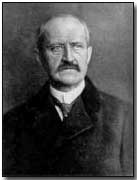Who's Who - Georg Michaelis
 Georg Michaelis (1857-1936) was
Bethmann-Hollweg's
successor as German Chancellor in July 1917, and was sufficiently obscure
that the Kaiser,
Wilhelm II (who had rejected two earlier nominees), had only the vaguest
idea who he was.
Georg Michaelis (1857-1936) was
Bethmann-Hollweg's
successor as German Chancellor in July 1917, and was sufficiently obscure
that the Kaiser,
Wilhelm II (who had rejected two earlier nominees), had only the vaguest
idea who he was.
In fact Michaelis had established his reputation, such as it was, chiefly as a civil servant. He spent the first three years of the First World War in management of the country's grain supplies as chairman of national food distribution, a role in which he failed to distinguish himself.
In the immediate years prior to the war Michaelis had served from 1909 as undersecretary of state in the Finance Ministry.
With the final ousting of the long-serving Bethmann-Hollweg - who could no longer command support from either left or right wings of the political and military elite - Michaelis was the surprising choice of the Third Supreme Command for Chancellor (and concurrently as president of the Prussian state ministry).
The Third Supreme Command was however by this stage the real ruling force in Germany. An effective military dictatorship, the body was overseen by Paul von Hindenburg and Erich Ludendorff, the heroes of the campaign on the Eastern Front.
In reality Michaelis was by no means their first choice as replacement for Bethmann-Hollweg. However their first two suggestions - former Chancellor Bernhard von Bulow and ousted naval minister Admiral Alfred von Tirpitz - both proved unacceptable to the Kaiser.
Given Michaelis' obscurity he was in some ways an ideal choice for Hindenburg and Ludendorff. Because he could command no established support in the Reichstag he was therefore entirely dependent upon the Third Supreme Command in retaining his position.
Even with the support of the Third Supreme Command Michaelis' tenure as Chancellor was short-lived. Having shown himself evasive in replying to the Reichstag's peace resolution of 19 July and to Pope Benedict XV's peace proposal of August 1917, his already minimal support dwindled.
Less than four months after taking office on 14 July 1917 he was obliged to tender his resignation on 1 November after a (patently unsuccessful) attempt at blaming the Social Democratic Party (SDP) for naval unrest in the autumn.
Michaelis was replaced by yet another obscure figure, Count Hertling. Michaelis himself attempted to retain his role as Prussian premier, without success. He thereafter became president of the local government of Pomerania (1 April 1918-31 March 1919) and later involved himself in Protestant church organisations and projects for student welfare. He joined, in 1919, the National People's Party (DNVP).
Georg Michaelis died on 24 July 1936 in Bad Saarow-Pieskow at the age of 78.
By 1918 the percentage of women to men working in Britain had risen to 37% from 24% at the start of the war.
- Did you know?
